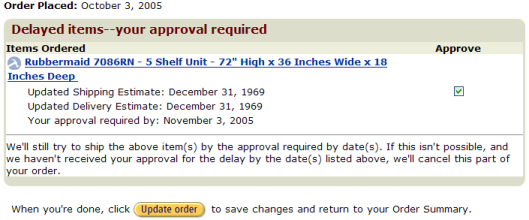I had ordered some rubbermaid shelves from Amazon recently (since nobody locally sells them). Apparently Amazon.com has trouble getting the shelves too and sent me a message asking to approve a delay. Here's what I saw.
Now, either there's a bug in their time handling (passing a zero to localtime(), anyone?) or they've got a way cool time machine. Either way, it cracks me up. Just reading the text below the weird dates makes me smile.
Posted by jzawodn at October 29, 2005 10:26 AM | edit
The result of trying to date format an invalid timestamp. PHP does this IIRC.
Amazon does not use PHP, they use Mason. But Perl has a localtime() function as well (it's just the C function in both cases.) So localtime(0) would indeed return Jan 1, 1970 GMT or Dec 31, 1969 PST.
Not necessarily 0, maybe an uninitialized scalar.
This is obviously a bug...
Not usings strict & warnings/diagnostics, are we, Amazon? :-)
Heh. Our internal order tracking system often puts "2069" as the year for the shipping date, until it's actually manufactured and close to shipping.
It's somewhat comforting when companies as big as Amazon make these mistakes. Blockbuster onced shipped me a dvd labeled "1 of null".
So what was the point of bringing up PHP? A Unix timestamp of 0 or an invalid value that evaluates to 0 gives you that date in any language.
Uh, for an example...
Amazon uses Mason? Really? Where'd you get that rumor from?
Mike - take a look at http://masonhq.com/?AmazonDotCom
I've seen some Amazon job offers at http://jobs.perl.org that have to do with Mason, too.
That is pretty funny, I really do wonder what would make it display that date.
Maybe the time-stamp is OK and the clock moved an hour or so. ^__^
Yes, Amazon is a heavy user of Mason and has a number of Mason experts (Jonathan Swartz among them).
Jeremy - your bug has been fixed. :)

